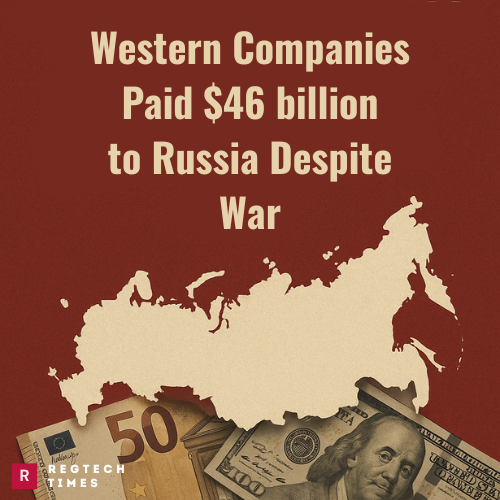Despite the ongoing war in Ukraine and strong sanctions from the West, many major Western companies have continued to operate in Russia. According to an investigation published on June 10, these firms have paid at least 40 billion euros—around $46 billion—in taxes to the Russian government over the past three years.
This massive amount equals nearly one-third of Russia’s entire defense budget for 2025. While Western governments have pledged support to Ukraine, many of their own companies have been helping fund the country they are sanctioning—through corporate tax payments.
Out of the top 20 foreign companies paying the most taxes to Russia, 17 are from countries that openly support Ukraine, such as the United States, Germany, Italy, and Austria. These nations have also provided around $170 billion in military and humanitarian aid to Ukraine since 2022.
Among the top contributors is Raiffeisen Bank, a large Austrian bank, which paid 457 million euros (about $522 million) to Russia in taxes just in 2023. Philip Morris, PepsiCo, UniCredit Bank, and Mars were also named in the report as major tax-paying firms that remain active in Russia.
Many Businesses Have Stayed Despite the War
At the start of the full-scale invasion of Ukraine in 2022, many expected foreign companies to leave Russia. However, that has not been the case. Out of more than 4,000 foreign businesses operating in Russia, only 472 have fully withdrawn. Another 1,360 have reduced operations, but most continue to work and pay taxes in the country.
These companies span many industries. From banks like UniCredit and Raiffeisen, to food and beverage giants like PepsiCo and Mars, to tobacco makers such as Philip Morris—all have contributed to Russia’s tax income while publicly stating their support for peace.
Surprisingly, U.S.-based companies have generated the highest total revenue for Russia, followed by companies from Germany. Despite sanctions and government warnings, many of these businesses have not made complete exits.
While their home countries back Ukraine, their business choices tell a different story—one that’s complicated by contracts, local staff, and billions of dollars in stakes.
Companies Explain Staying, But Exiting Is Costly
Companies still operating in Russia gave different reasons for staying. Some said their goods are important to everyday Russians—like food, medicine, or household essentials. Others said they feared that leaving could put their employees in danger or lead to government retaliation.
But it’s also about money. Leaving Russia is expensive and difficult. The government requires foreign companies to sell their assets at very low prices—well below market value. In some cases, if companies stay but don’t follow Russian rules, the state can even seize their assets.
Reports say that companies that have chosen to exit have together lost more than $170 billion in write-offs, asset losses, and so-called “exit taxes.” These high costs discourage many from leaving, even if they face criticism at home.
At the same time, Russia has sent mixed signals. While Russian leaders publicly threaten to “strangle” Western businesses still operating in the country, they are also preparing for the possibility that these same companies might want to return. In February, Russian officials were told to get ready for such re-engagement. But so far, no company has officially asked to return.
So while the war continues, Western companies still play a major financial role in Russia—whether they intend to or not.


